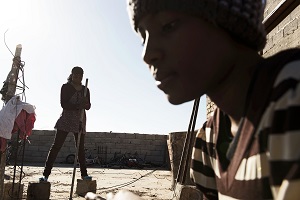Children on the move from Africa do not first aim to go to Europe, new UNICEF study shows
Vast majority leave home alone without their parents’ knowledge and flee because of trouble at home
Children on the move into Europe from Africa take the decision to leave home on their own and do not initially intend to go to Europe. For the majority the systematic trauma and abuse they witnessed or suffered in Libya caused them to flee to Europe and take the terrifying Central Mediterranean sea route, according to a new study commissioned by UNICEF and carried out by REACH.

Congolese refugee Tsunon, 12, plays on the rooftop of her family's home as her sister Christelle, 15, sits nearby in Janzour, Libya.
As many as 75 percent of the refugee and migrant children interviewed in Italy as part of the study, took the decision to embark on the journey alone. The journey itself can take a staggering two years or more for children. One of the key reasons children give for leaving home was violence at home but also deprivation and conflict. Child marriage was also reported as the main reason for leaving by 1 in 5 of all girls interviewed. Children’s journeys to Europe were often fragmented and their destination changed along the way.
“What is striking about this study is it shows for the first time that there are overwhelmingly far more reasons that push children to leave their homes, than has been previously understood, and fewer pull factors that lure them to Europe,” said Afshan Khan UNICEF Regional Director for Europe and Central Asia.
The aim of the study, a partnership between UNICEF and REACH, is to provide decision makers, partners and governments with evidence on what drives children to flee their countries and homes. The interviews were conducted in the two main gateways into Europe – Italy and Greece – with a total 850 children, between the ages of 15 and 17 years old.
Refugee and migrant children in Italy unanimously reported their time in Libya as the most traumatising part of their journey on land. Almost half of them (47 per cent) reported to have been kidnapped for ransom in Libya, and one in four children (23 per cent) reported to have been arbitrarily arrested and held in prison without charges. The majority come from various countries in sub-Saharan Africa but some are from as far afield as Bangladesh.
“For those who did aim to come to the continent, the allure of Europe was the chance of furthering their education, respect for their rights and getting ahead in life. However once they reach Europe the reality is sadly quite different and their expectations are shattered,” said UNICEF’s Afshan Khan.
In Greece the survey showed that one in three parents or caretakers said that seeking education for their children was the main reason they left their countries for Europe. However the survey of refugee and migrant children revealed that lengthy procedures and confusion about their rights have led to many children dropping out of the Italian and Greek reception systems, losing out on education and exposing them to high risks of abuse and exploitation.
Of the 12,239 children who arrived in Italy in the first six months of this year, 93 percent travelled alone.
Source:United Nations Children's Fund
- 253 reads
Human Rights
Ringing FOWPAL’s Peace Bell for the World:Nobel Peace Prize Laureates’ Visions and Actions

Protecting the World’s Cultural Diversity for a Sustainable Future

The Peace Bell Resonates at the 27th Eurasian Economic Summit

Declaration of World Day of the Power of Hope Endorsed by People in 158 Nations

Puppet Show I International Friendship Day 2020

